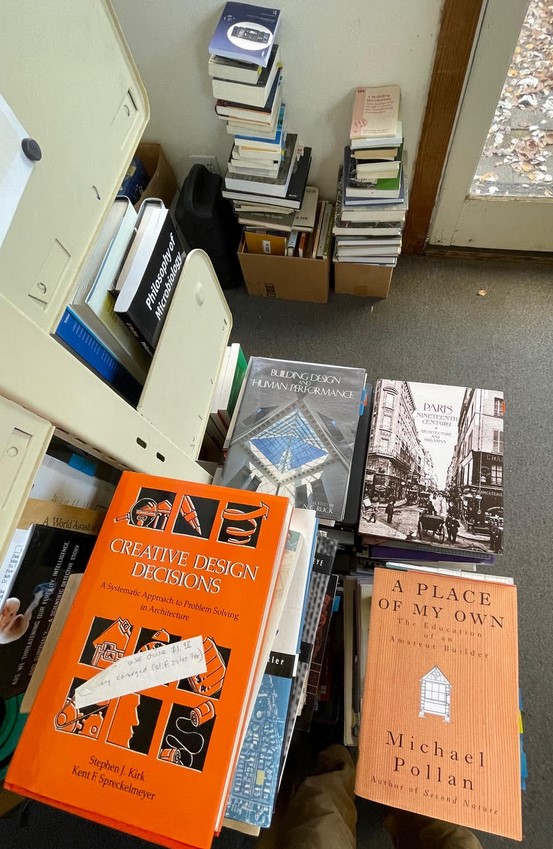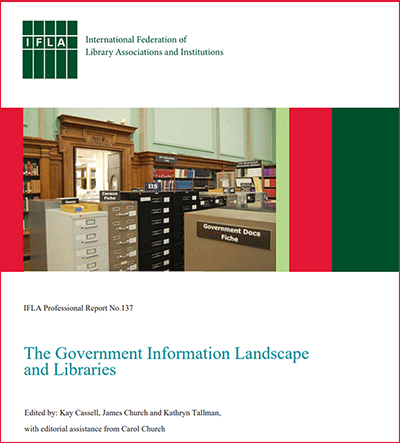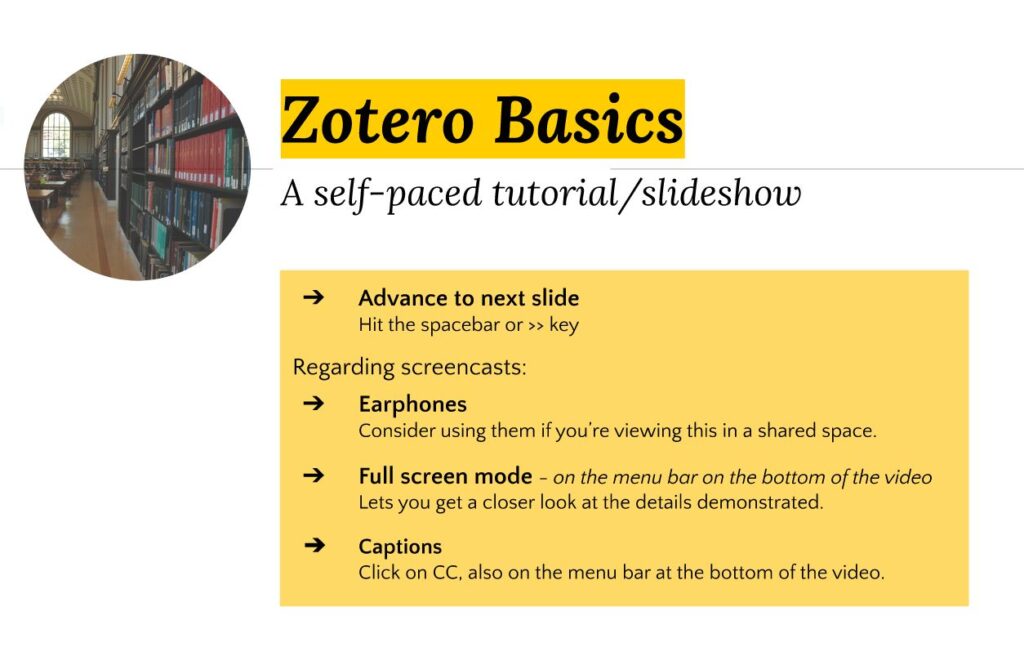Social Science
Jim Church in print: The Government Information Landscape and Libraries
Librarian for Economics, Political Economy, and International Government Information Jim Church is one of the three editors of the just released IFLA publication The Government Information Landscape and Libraries, which provides case studies on challenges and opportunities for access, preservation and digitization of government information around the world. Jim is also the author of the chapter on international governmental organizations (IGOs), and he provides a terrific overview of this complex and challenging area. As Jim states, “IGO documents and publications often do not show up in Google Scholar or in the Indexing and Abstracting databases that libraries purchase. They are often not cited, or cited poorly.” Yet they are an important, often essential, source for researchers seeking information (numeric and textual) on a wide array of global topics.
We are very fortunate to have Jim’s expertise at Berkeley, and it’s great that it’s now being shared globally through this open access resource!
Susan Edwards,
Head, Social Sciences Division
Social Welfare Librarian & Interim African Studies Librarian
A Library Research Journey (Pandemic Edition)
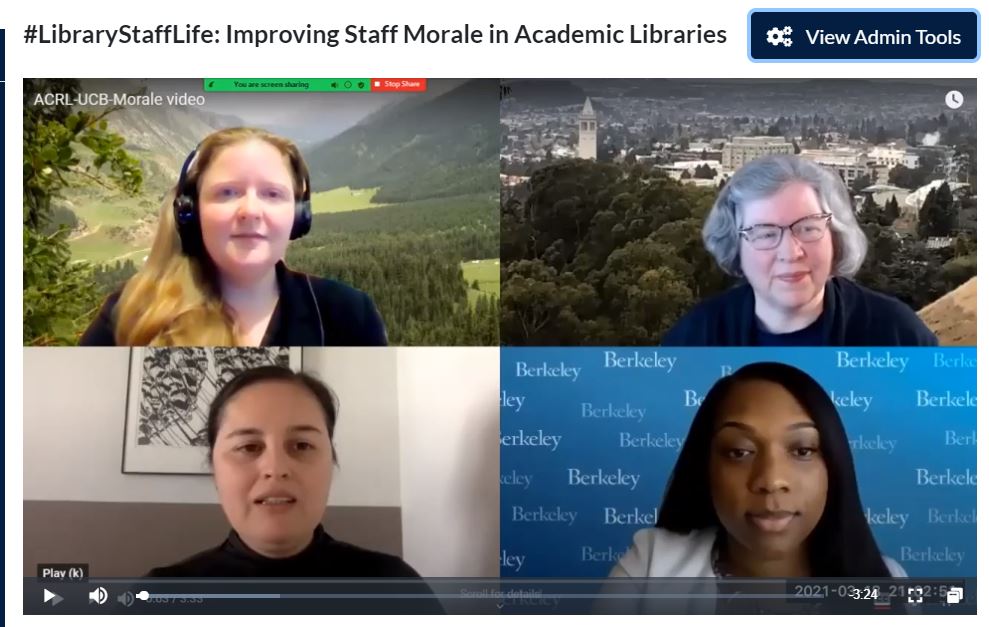
Even beyond those who believe that librarians sit around and read books all day (which would be delightful but is most definitely not our reality), many are surprised to learn that librarians double as active researchers. This is especially true in settings where librarians are members of the faculty, but even where that isn’t the case, such as at Berkeley, librarians are born investigators and it carries over into wanting to find out about and add to knowledge of our settings.
What does it look like to conduct library research? Glad you asked! In our case, it started with a conversation and an idea. Natalia Estrada (now Berkeley’s Political Science and Public Policy Librarian, then the Social Sciences Collection and Reference Assistant and in library school) and I were talking about how much we admired the work of Kaetrena Davis Kendrick. Kendrick wrote a foundational work in the study of librarian workplace morale, The Low Morale Experience of Academic Librarians: A Phenomenological Study, and it sparked many more studies on this topic. But, where were the studies of library staff experiences? We wanted to find out!
We were lucky to recruit two colleagues who added so much to the team: Bonita Dyess, Circulation/Reserves Supervisor at the Earth Sciences/Map Library, and Celia Emmelhainz, Berkeley’s Anthropology & Qualitative Research Librarian. First we applied for (and eventually got) funding for the research from LAUC (the Librarians Association of the University of California). This meant we could pay for transcribing our interviews, give the participants gift cards, and buy qualitative data analysis software. Then we applied for (and got) approval from the IRB (Institutional Review Board), making sure we were complying with processes for research with human subjects.
Here’s where the “pandemic edition” part comes in. All this planning and applying, starting in November 2019, took time; so, at the point we were actually ready to recruit participants, it was April 2020. We were sheltering in place, and not sure how this all would work (although it was probably better than having to go virtual in mid-stream)! Nevertheless, we hurled out information about and invitations to be part of the study to every list-serv, association, and friendly librarian we could think of, nationwide. We ended up doing 34 interviews with academic library staff from a range of locations and institution types (purposefully excluding the UC system), during a three-week period in May-June 2020. Due to COVID these were all online, either by phone or Google Meet (sort of like Zoom), and we asked a structured list of questions, with room for branching into other topics, or diving deeply. Celia trained a wonderful student to transcribe the interviews, and once we had those transcripts and stripped identifying information from them, we were off– coding away (using MAXQDA software), and drawing themes, quotes, recommendations, and other findings from the surprisingly rich information we’d collected.
Next—we had to start getting the information out into the world! Our eventual goal is to write a paper, or several, for publication. There are a number of library and information science journals out there that we are considering… but that takes time as well, and we wanted to start presenting our findings sooner. So, we did an “initial findings” presentation to the UC Berkeley Library Research Working Group, and then stepped into the big time with acceptance to present a poster at the 2021 Association of College and Research Libraries online conference (our poster got almost 600 views), and with a webinar we did for the Pennsylvania Library Association (both the poster and the webinar slides are available through the UC’s eScholarship portal). All our work to get to this point is hopefully now helping others.
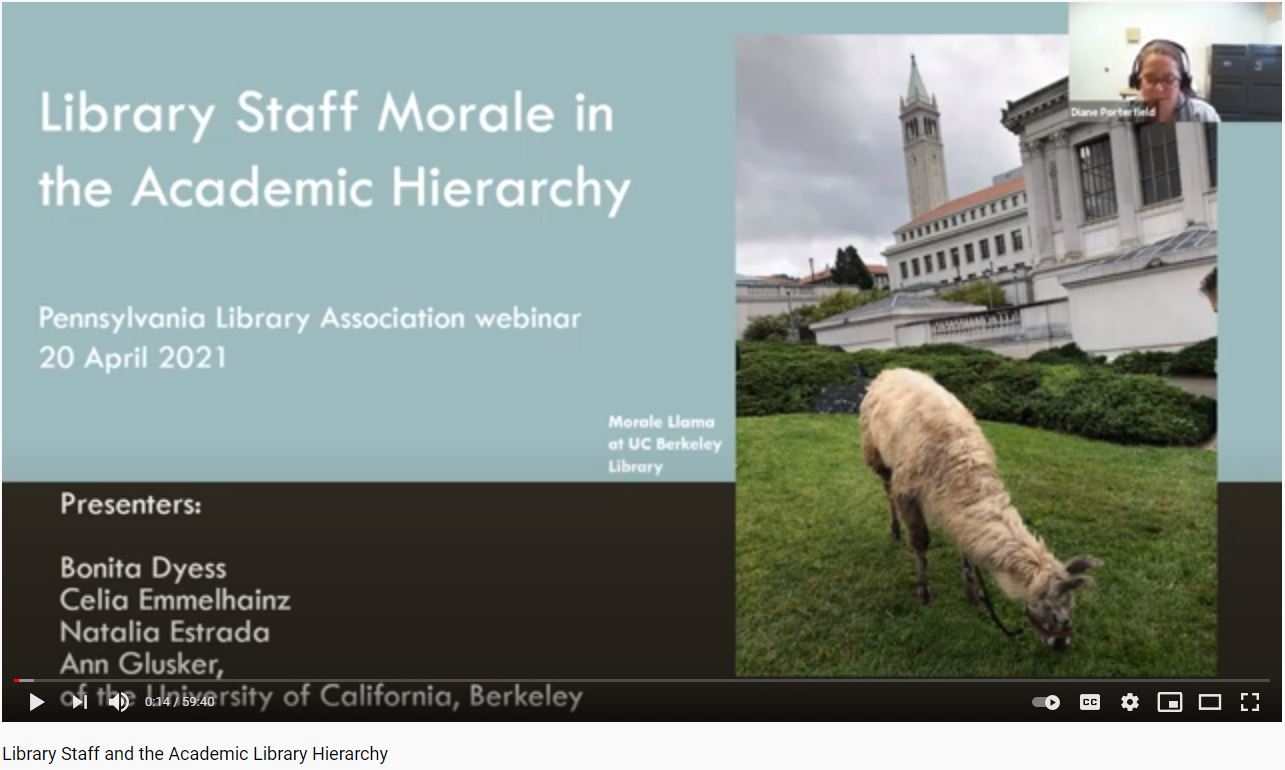
And, a word about connecting with our participants. We were bowled over by their generosity with us and by all they had to say: much that we didn’t expect, and much that they were grateful someone was even asking about. It ended up that we had captured one of the last opportunities to get a snapshot of pre-COVID library staff life; people were still in limbo, and talked about their regular jobs before any lockdowns, for the most part. At that point most expected to be back in their libraries and all to be normal by the end of the summer 2020. We know now that that didn’t happen, and we know that library re-openings and staff roles in them have been challenging and sometimes contentious; we wish we’d known to ask for permission to re-interview our participants—even if only to check in with them. But how could we have known? We wonder how they are.
So now, we have papers to write, and thinking to do about how to take our questions into new avenues of research—because it’s a never-ending, and completely exciting process, and, we suspect, will be very different (easier? or not?) in the post-COVID landscape. Do you have ideas for us? We’d love to hear them! Or want to hear more about our morale study? Please get in touch with us at librarystaffmorale@berkeley.edu!
Wikipedia, Knowledge Equity, and Researching Herstories

You may have heard that last week the Library hosted its now-annual Wikipedia edit-a-thon, a gathering of editors and fans of this amazing online resource (side note: speaking as a librarian who was taught that since Wikipedia is crowd-sourced it’s unreliable, I can say I’ve come to a much more appreciative stance after learning about its culture of fact-checking and reference, and in fact using the reference lists in articles on many occasions). Wikipedia is central to our knowledge landscape, and the UC Berkeley Library’s edit-a-thons are held so that we can improve on this landscape in the areas of art + feminism, and race + justice.
This year, because the edit-a-thon was virtual, we organizers were able to present a fascinating two-hour keynote and workshop given by Dr. Alexandria Lockett, of Spelman College in Atlanta. Dr. Lockett is a long-time Wikipedian (she started editing in 2003) who incorporates Wikipedia in her teaching, and works to question the politics of citation practices, representation, and knowledge equity there (check out her recent book chapter, “Why Do I Have Authority to Edit the Page? The Politics of User Agency and Participation on Wikipedia”).
Her talk, “Research for Knowledge Equity” had important content for everyone attending, whatever their Wikipedia editing level or interest. Dr. Lockett focused on knowledge production, and how that can “marginalize Black, Indigenous, People of Color (BIPOC) scholarship and media, LGBTQ persons, African scholarship and media, women scholars regardless of color, disabled scholars, etc.” (she noted that there are Wikipedia campaigns meeting this issue, particularly #CiteBlackWomen and “CiteaSista”). She then went on to outline methods and resources for doing herstorical research, particularly on the history of Black women. Bringing the perspectives of inclusive knowledge production and informed research strategies to our editing means that Wikipedia can start to become a force for change from within, moving towards knowledge equity. As Dr. Lockett notes, “This is intellectual labor, not just tacking on facts. It will change your perspectives on knowledge production.” Want to know more? Dr. Lockett has made her slides and her list of potential articles to edit available!
After the workshop, the edit-a-thon continued in its classic format, superimposed onto Zoom. We had an editing instruction session, a breakout room for one-on-one help, and one for open editing for those who wanted a collegial space in which to work. I, for one, felt fired up by what I’d heard from Dr. Lockett, and decided to see if I could improve an article on Carol Blanche Cotton (Bowie), a Black psychologist whose dissertation focused on cognitive testing of children with disabilities, and whose name was on a list of articles needing edits. Using my librarian super searching skills (AKA Google Scholar in this case), I found an online reference to her great grandmother, Rebecca Harris, in a 1983 article titled “The Antebellum ‘Talented Thousandth’: Black College Students at Oberlin Before the Civil War”. Once I did that, I was able to add the section circled in the image above to Dr. Cotton’s Wikipedia page. It felt so rewarding to connect Dr. Cotton to her ancestor, who believed so strongly in education that she moved her entire family to Oberlin, and along the way I learned more about two women—Dr. Cotton and Rebecca Harris—who I will never forget. I hope you, reader, will have the chance to get just as excited about learning and editing, in one of the many online editathons happening now, and also at our 2022 edit-a-thon—watch this space!
Library’s Wikipedia Edit-a-Thon: Coming Soon (3/10) to a Screen Near You!
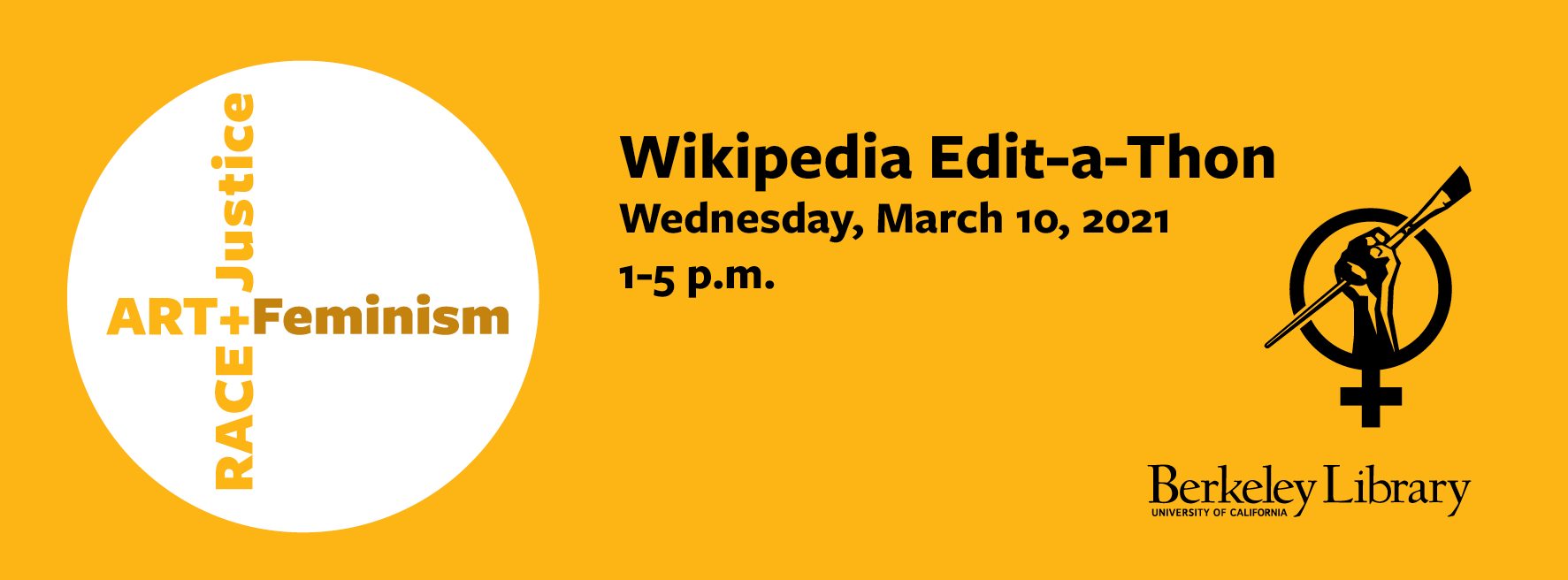
For many of us in the library, last year’s Wikipedia Edit-a-Thon on March 4 was the final program we held in person before the pandemic lockdowns (we actually wondered at the time whether attendance would be down due to the spread of the virus, but we had a great crowd).
Happily for us, the edit-a-thon, which is an event that gathers people together to expand and improve on the amazing information resource Wikipedia, can easily transition to an online format! The National Network of Libraries of Medicine has been holding national online edit-a-thons for years, and there are many other wonderful offerings, themed and general, to take advantage of online (check out this set of events “Honoring Indigenous Writers” from the University of British Columbia).
So, this year, our edit-a-thon will be virtual. Please come edit with us on Wednesday, March 10, from 1:00-5:00 PM! (or any portion of that time that works for you) We’ll use Zoom as a way to hold our guest speaker session and workshops on how to edit, and we will even have breakout rooms for the various editing preferences and needs of attendees. More information and the schedule can be found here; the only thing you need to do is register using this form (in order to get the Zoom link), and show up online on the day! (It would also be great, if you want to actually edit, to set up your Wikipedia account in advance)
And, about the guest speaker aspect of the event—this year, we are thrilled to offer a two-hour Wikipedia workshop (from 1:00-3:00 PM) created and led by Dr. Alexandria Lockett, from Spelman University in Atlanta, GA. Dr. Lockett will discuss how both new and experienced editors can meaningfully contribute to underrepresented knowledge of Wikipedia through alternative research practices.
Questions? Feel free to email us at editathon@lists.berkeley.edu, and we hope to “see” you on March 10!
Love Data? Join Us During Love Data Week 2021, Feb 8-12!

Since our Love Data Week invitation post last year, the COVID pandemic has created a new world— and amazing new opportunities and challenges related to data. Just a peek at data.berkeley.edu (the portal for Berkeley’s Computing, Data Science, and Society Division) shows that data-related research during this past pandemic year, even with its intense and difficult challenges, has revealed new insights. Check out “Pandemic provides real-time experiment for diagnosing, treating misinformation, disinformation”.*
So, it’s fitting that Love Data Week 2021 at Berkeley, hosted by the UC Berkeley Library in partnership with Berkeley’s Research IT department, is focused on the kinds of issues we are confronted with in a wholly-online research environment. Join us on Tuesday for a session on ethical considerations in data, most definitely a concern with many of Berkeley’s researchers looking at issues related to COVID; on Wednesday for a talk on cybersecurity (aimed at graduate researchers but all are welcome); on Thursday for another security-related workshop, “Getting Started with LastPass & Veracrypt”; and on Friday for an introduction to Savio, Berkeley’s high performance computing cluster. Please click on this link for information on these, and registration links!
Questions? E-mail LDW 2021 at researchdata@berkeley.edu . And, if we’ve whetted your appetite for data and more data, take a look at the University of California-wide Love Data Week offerings. If you’ve ever wondered what an API is, or want a quick intro to SQL, or even just want to know what the acronyms stand for, there are these sessions and more!
* The same page makes it clear that data is for everyone; check out “I Am a Data Scientist”, about a student who came to Berkeley as an English major and discovered how data can “shed light on larger-scale questions”, and “Translating Numbers Into Words: The Art of Writing About Data Science”, featuring three Berkeleyites who are getting the word out about data.
Exhibit – Indonesia: Spectacles of Small-scale Gold Mining
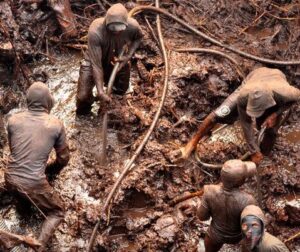
Indonesia: Spectacles of Small-scale Gold Mining, is now available online. Hosted by UC Berkeley’s Environmental Design Library, Professor Nancy Peluso’s photography exhibit explores gold extraction — and the people who live from it — in the West Kalimantan region of Indonesian Borneo. More than 100 high resolution images taken between 2014 and 2016 provide graphic insight into the daily work, tools and lives of the men and women who make their livelihoods in the Bornean gold fields. This exhibit is one of more than 50 exhibits in the multi-venued Extraction: Art on the Edge of the Abyss project.
Zotero Day – January 26 and February 1

Do you … ?
- … save random URLs in a Word or Google Doc?
- … save article PDFs on your desktop and as email attachments?
- … have a pile of article printouts sitting on your desk?
- … write down citations on sticky notes and post them to your monitor?
- … stay up late the night before a paper is due reconstructing your citations?
If you answered yes to any of the above … the answer is YES, you need Zotero (or some other citation management system).* Come to Zotero Day and learn more about this powerful tool for organizing your citations and creating bibliographies. Jennifer Dorner and David Eifler have been tag-team teaching Zotero classes which were very successful last semester, with one attracting over 150 attendees!
Spend an hour with Jennifer and David and learn to use this robust citation manager with Firefox and Chrome. These zoom workshop covers importing citations, exporting bibliographies into Word and Google Docs and sharing resources among groups. Three 1-hour sessions each day. (If you have a chance, download the program and browser connector at www.zotero.org before the workshop.)
Tuesday, January 26 (all classes are Pacific Standard Time)
- 10AM – 11AM
- Noon – 1PM
- 5PM – 6PM
Monday, February 1
- 9AM – 10AM
- 2PM – 3PM
- 4PM – 5PM
Please register to get the Zoom link – https://berkeley.libcal.com/calendar/workshops
* * * * * * * * * * * *
Can’t make it to these workshops? Try a self-paced tutorial? This tutorial includes 24 slides and 18 embedded screencasts (totalling approximately 18 minutes of viewing). Do the tutorial at your own pace and skip or fast-forward through the screencasts. In total, the tutorial can take anywhere from 15 minutes to an hour. Check it out at: Zotero Basics
* * * * * * * * * * * *
* adapted from Why use a citation management tool?, Gallagher Law Library, University of Washington.
Pandemic Pivot: Data Engagement — from Berkeley, not Gothenburg
So many of us have a dream that didn’t take place this year. Mine was to go to the Volvo Museum in Gothenburg, Sweden. I’m a big Volvo fan: here’s my 1992 wagon, who the mechanic said wouldn’t make it from Seattle to Berkeley when I moved here. He was wrong, she flew into Berkeley in style. She’s a champ.

But, I digress! The reason I was due to be in Gothenburg at all was to give a talk at the 2020 IASSIST (International Association for Social Science Information Service and Technology) conference there in May, but of course like so much else the conference was canceled. I was pretty disappointed, especially since this was my chance to take a presentation I’d given for public librarians in 2017 and re-envision and reinvigorate it for academic librarians in 2020.
I got very lucky though…in mid-March, just as conference cancellation news came through, and the Bay Area’s shelter-in-place was declared, a colleague encouraged me to submit something for consideration to the ICPSR (Inter-university Consortium for Political and Social Research) Data Fair, already slated to be held online in the fall.
Reader, I pivoted! I was able to take the proposal for the Gothenburg lightning talk (about 7 minutes), and expand it into a proposal for an hour-long webinar, online from Berkeley. It was accepted! As I started to work on it, I discovered I had perhaps promised I’d talk about approximately three hours’ worth of material, so condensing it was a challenge—perhaps because it is on a subject I feel passionately about—“Data Engagement for the Data-Hesitant Librarian”. My strong belief is that many of us, and I tend to think especially about librarians, are led to believe that data is some big, mysterious, and daunting mountain we don’t want to climb, when actually we already have much more skill, comfort, and experience working with it than we think.
So, I tried to create a talk that had some fun in it, and some data-related resources that are practically begging to be explored. Interested in how we can combat misinformation? Check out callingbull.org, by the authors of the new book Calling Bull: The Art of Skepticism in a Data-Driven World. What about critical data literacy and data justice? Take a look at this guidebook from the Data Justice Lab, complete with interactive learning tools. Perhaps a recipe from The Library Assessment Cookbook appeals? Or maybe you just want to learn more about the Burning Man event, from the Burning Man Census data they collect each year.
Whatever your interest, geek out proudly! You can find the talk here (Is.gd/DataEngage_Talk —check out the other ICPSR Data Fair talks while you’re there) and the slides here (Is.gd/DataEngage_Slides). I hope you find something to interest and engage you, and I’d love to hear what you think—feel free to drop me a line at glusker@berkeley.edu!

COVID Chronicles: ICYMI edition
International Newspaper Display at Moffitt Library
It started with a tweet, back in July, by Berkeley City Councilmember Rigel Robinson (UCB 2018) describing the international newspaper display outside of Moffitt Library.
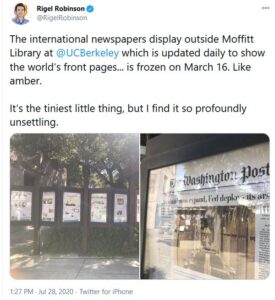
Robinson’s tweet got picked up by Berkeleyside, the online news source for all things Berkeley. The Berkeleyside story provided background on the international newspaper display in the plaza outside Moffitt Library and the Free Speech Movement Cafe and spoke with our Social Sciences Division colleague, Glenn Gillespie, Reference/Government Information Specialist.
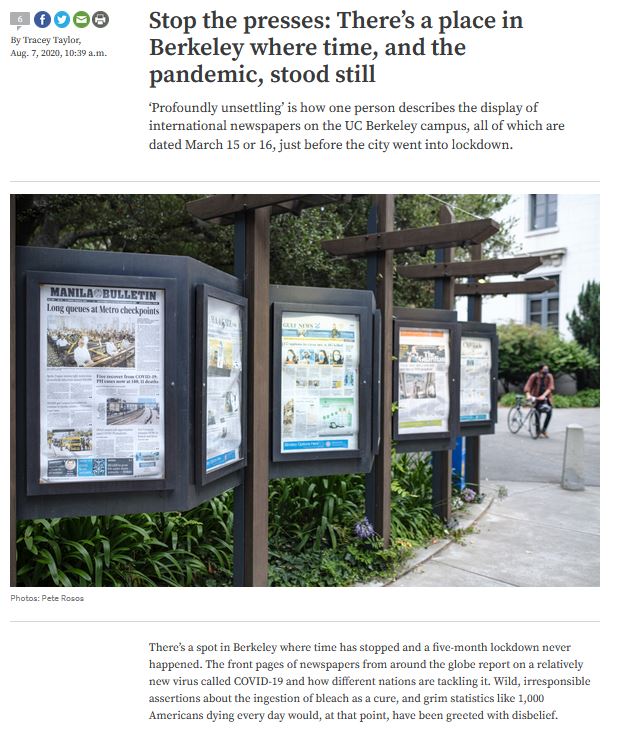
Just to play up the whole time warp/time capsule theme, it has been four months since this story appeared. And, at the time, it had been five months since the newspapers had been updated. Where exactly did 2020 go? Has it been the longest year on record? Or the shortest?
An Iconic Gift
This post is by Environmental Design Library librarian David Eifler; if you haven’t seen him, or his wonderful library (one of more than 25 on campus), you can check them out by joining him on this Virtual Tour.
**
While I was in high school, my small businessman dad came home one evening with a book. Although he had a natural curiosity and often read the encyclopedia for pleasure, I’d never seen him as excited about the written word as when he brought home The Last Whole Earth Catalog: Access to Tools – the one with the shadowed view of the “blue marble” on the cover. Now considered by many a precursor to the World Wide Web, it was a compendium of tools and books to improve the planet. Decades later, when I arrived to the Environmental Design Library (ENVI), I was pleased to find it and other editions in our collection. Librarian Elizabeth Byrne proudly told me that its author, Stewart Brand, had written a classic, How Buildings Learn: What Happens After They’re Built, while doing the research in our library.
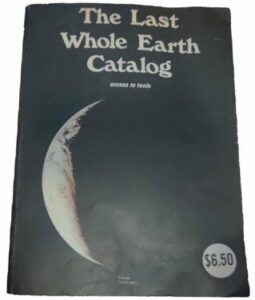
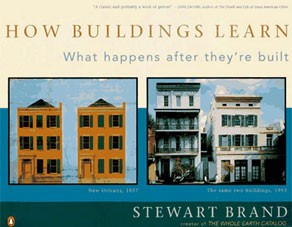
So, I was thrilled when Brand contacted me in late November and asked if ENVI would accept approximately 200 books used to write How Buildings Learn. He’s working on a new book and needed to purge his library of volumes from past projects. The founder of the WELL (Whole Earth ‘Lectronic Link) with Dr. Larry Brilliant (now a CNN COVID-19 expert) and CoEvolution Quarterly met me at his Sausalito office on a sunny December morning and gave me 11 boxes of architectural books. The Library got the books, and I had the great pleasure of meeting a national icon.
